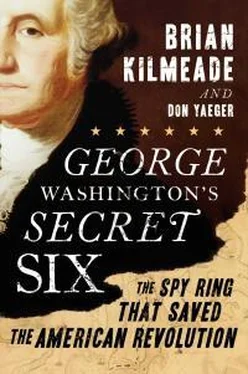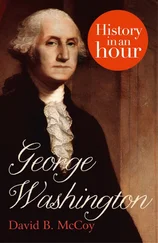Quickly recognizing that Scott’s efforts could easily go the same way as Nathan Hale’s and Nathaniel Sackett’s, Washington scrambled to find another man to head up the actual infiltration of New York. He needed someone who knew not only the city and the various routes into and out of it but also enough trusted locals to recruit as spies. The candidate would also need to be nearly inexhaustible if he were to devote the time, strategy, and energy necessary to make the ring successful.
Fortunately for Washington, one of the rising young stars of the Continental Army fit the bill exactly. Benjamin Tallmadge, a gallant young major whose curls always seemed to be escaping beneath his sharp dragoon helmet, was still rather green, but his keenness of mind was apparent to everyone who met him, and he knew how to earn the respect and faith of his men despite the occasional misstep. Besides, his demonstrated courage, his imagination, and, most important, his background made him the perfect candidate.
A RISING STAR
Major Benjamin Tallmadge was a rather unlikely military man. He was born on February 25, 1754, the second son of the Reverend Benjamin and Susannah Smith Tallmadge, in a parsonage in Setauket, a hamlet in the region of Brookhaven, Suffolk County, Long Island. The son and grandson of a minister, young Benjamin seemed destined for the pulpit rather than the trenches.
Benjamin Junior was an extremely bright, precocious child. One of his father’s duties as parson was to instruct the young men of the village who were hoping to attend college, preparing them for the rigorous entrance exams by supplying them with the requisite knowledge of Latin, Greek, theology, and rhetoric. Energetic and enthusiastic about anything that seemed remotely challenging, young Benjamin was eager to join his father’s classes and thrived under increasingly difficult curricula. By the age of twelve or thirteen, he had proved so proficient that he was admitted to Yale by the college president, but the Reverend Tallmadge felt his son was too young. At his father’s bidding, Benjamin waited until he was fifteen to enroll. In the meantime, Susannah died, leaving the Tallmadge men alone in the parsonage. The sadness in the house following her passing was oppressive, and Benjamin found that leaving was something of a relief.
He was well prepared for college life. “Being so well versed in the Latin and Greek languages, I had not much occasion to study during the first two years of my collegiate life,” Tallmadge later admitted, “which I have always thought had a tendency to make me idle.” But his time was not wasted. He quickly became popular among his classmates, including Nathan Hale, who found Tallmadge’s intelligence, energy, and good nature fascinating.
Playhouses were very rare in the colonies at the time, and public opinion considered theater somewhere between frivolous and downright sinful. This irresistible combination of novelty and potential scandal made theatricals a favorite pastime among college students. Tallmadge and Hale were often at the center of these productions, and frequented several other clubs that explored the various disciplines future schoolmasters should master: astronomy, geometry, history, debate, and natural sciences. These subjects were also covered in classes, but this was the Age of Enlightenment and the pursuit of knowledge was all the rage—even among fun-loving young men.
Benjamin graduated from Yale in 1773 with a distinguished academic record, despite his somewhat lackadaisical freshman and sophomore years, and a severe bout of measles that marked part of his junior and senior years; he was even invited by the college president to speak at the commencement ceremony. Upon graduation, the position of superintendent of the high school in Wethersfield, Connecticut, was offered to him, and Tallmadge seized the opportunity to impart his enthusiasm for study to a younger generation. There, he served faithfully for three years, though his ambitions drew him toward the legal profession and he began to seriously consider studying law.
But in the spring of 1775, “the shot heard ’round the world” rang out at Lexington, Massachusetts, followed by a skirmish at Concord a few hours later. That one day, April 19, would mark an indelible change in the course of history, and Benjamin Tallmadge, like many other young men of his time, was swept up in Patriotic fervor as the War of Independence officially began. The bloody battle at Bunker Hill raged shortly afterward in June, and Tallmadge took advantage of his school’s summer holiday to ride the one hundred miles to Boston to learn of the latest news firsthand. He met with some Connecticut friends who had been involved in the combat, and their stories of heroism and zeal began to shift Tallmadge’s goal from fighting injustice in the courtroom to fighting tyranny on the battlefield.
He began the fall term at Wethersfield seriously weighing various courses for his future. With the arrival of 1776, the Continental Congress gave approval for the colonies to actively expand their fighting brigades. Captain John Chester, one of friends with whom Tallmadge had visited the previous summer, was elevated to the rank of colonel, and invited Tallmadge to join his regiment as a commissioned officer. Thus, Lieutenant Benjamin Tallmadge, his commission signed by Governor Jonathan Trumbull, took his leave of the school at the end of the term and officially became a member of Connecticut’s Continental Line on June 20, 1776.
It was a move that astonished Benjamin’s father and his second wife, the former Miss Zipporah Strong. As his unit marched toward Manhattan, Lieutenant Tallmadge gained leave to venture across the water to Long Island to see his family. His pious father was shocked to learn that both Benjamin and his older son, William, had enlisted, but he granted his blessing at Benjamin’s request.
Now a soldier, Tallmadge continued to distinguish himself with his boundless energy and uncanny knack for winning people over, but the art of war didn’t come easily to the new recruit. With August came the fateful Battle of Brooklyn and the betrayal of Brigadier General Nathaniel Woodhull and his branch of the Long Island militia at Jamaica Pass. The battle was Tallmadge’s first taste of war, and it shook him.
“This was the first time in my life that I had witnessed the awful scene of a battle, when man was engaged to destroy his fellow-man,” Tallmadge wrote more than fifty years later. “I well remember my sensations on the occasion, for they were solemn beyond description, and very hardly could I bring my mind to be willing to attempt the life of a fellow-creature.”
Their father’s blessing proved fruitful for Benjamin but not for his brother William. At the same time that Benjamin was experiencing such a conflict of conscience at the horror of killing, William was being hauled off as a prisoner, captured in battle by the British. In the desperate weeks that followed, Benjamin’s good nature and dogged determination failed him for perhaps the first time in his life. Together with some influential friends, he made repeated attempts to have provisions delivered to William in the British prison ship where he was being held, but all efforts were rebuffed, all food parcels and blankets denied. William starved to death at some point in the autumn of 1776, and his body was either thrown over the side of the ship into cold New York Harbor or buried in an unmarked grave on the shore.
Nathan Hale’s death, coinciding with William’s desperate plight, was a difficult blow. Tallmadge’s conscience shouted that he would have been a far better man for the job than poor Hale, who had never even set foot on Long Island. But the opportunity had not been offered to Tallmadge and he had precious little time to dwell on the tragedy. His unit continued to march with General Washington, engaging in the Battle of White Plains on October 28, when Benjamin himself was very nearly captured by Hessian troops as he was ushering his men across the river.
Читать дальше












